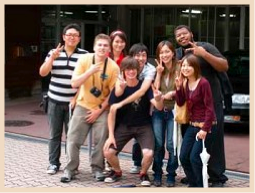
Todd Jay Leonard, Blog


Saving the best until last, my 10th installment for the series "Todd's Top 10 List of Things Japanese" is what makes Japan so special and why I consider it my second home: its culture and its people.
Of course, there are nice people - and some not-so-nice people - everywhere. Japan is no exception. Every culture has its positive attributes and not-so-great realities.
For instance, a well-known trademark of Americans is friendliness with a sense of wanting to help one's fellow human being. Japanese people are widely considered to be a nation of very polite people, putting the "group" needs above one's individual needs, helping to keep society moving smoothly.
As expected, these examples are too simplistic, perhaps stereotypical, to be entirely accurate. Many Americans aren't at all friendly and have little regard for the needs of others, and an equal number of Japanese are impolite and self-centered. Lumping an entire group of people into one category is quite dangerous because differences - both positive and negative - do exist within any culture.
However, a number of people do make certain sweeping generalizations about a country and its people in order to make a point, tell a story or try to compare the minor differences rather than concentrating on the overwhelming amount of similarities.
Making personal observations about a group of people is tricky, because it is filtered through one's own cultural attitudes, ideas and experiences which have served to mold and define core characteristics of one's being and personality.
When I was a 17-year-old Shelbyville High School student, I remember an orientation session I attended as I prepared to go to Japan as an exchange student. The facilitator was trying to impress upon us the importance of seeing another culture not through our own eyes but from an alternative perspective - through the eyes of the host culture's inhabitants. He said that as we depart for Japan to experience its culture, food, customs, way of living and lifestyle, we needed to take off our own cultural sunglasses.
For example, if Americans wear yellow cultural sunglasses and Japanese people wear blue cultural sunglasses, we will see only green if we fail to take off our own sunglasses before putting on the other culture's.
This illustration impressed me so much that after nearly 30 years, I still remember it as if it were yesterday. Too often, as a member of a specific cultural or ethnic group, we humans tend to focus on the cultural differences with the other groups without taking into account all the many similarities that various groups of people from different ethnic backgrounds share and have in common.
I have had the great fortune to live in North America, Central America, Europe and Asia. Although each place differed geographically, it was amazing to me how similar so many aspects of each culture's core characteristics were. Of course, many beliefs, rituals, customs and traditions were quite different, but the most basic of needs, desires, wants and hopes were the same - the human aspect or the "humanity of culture."
The intent behind the act is often the same in every culture - be it life's rituals surrounding the birth of a new baby, transition into adulthood, marriage or funeral rites - all have commonalities in the purpose behind the ritual, custom or tradition.
So when I say I admire the Japanese as a people, it is, of course, on the most human of levels, but it is also with a sense of respect and appreciation for their cultural heritage that has served to make them who they are today.
Do I like everything about Japanese culture? No, just like I can't accept every aspect of any other cultural group, including my own. No matter how hard one tries, it is difficult to not carry some sort of cultural baggage when crossing cultures. One's own culture is such an integral part of a person's essence, and being that it is hard not to separate oneself from a lifetime of cultural ideas, attitudes and beliefs.
Cultural stereotypes
Recently a friend recounted to me a story about a relative who traveled to Hawaii. She said the woman complained about how rude all the Japanese tourists were behaving, pushing and shoving, talking loudly, without regard to the others around them, etc. First, this surprised me that all the Japanese tourists were being rude, because many of the things she described seemed so out of character according to my experience with Japanese people.
Second, it really surprised me, because today Japanese are quite savvy and well-seasoned travelers, being courteous and aware of others around them. At least, this has always been my observation.
Then it occurred to me that perhaps the person mistook the tourists as being Japanese just because they were Asian. Erroneously, some Americans tend to think all Asians hail from the same place and have the same cultural tendencies. It would be the same as putting Americans and Canadians in one category as being culturally one and the same.
Perhaps since Japanese are more common in some parts of the country, and are frequent travelers to Hawaii, it was assumed the people were Japanese.
It used to drive me crazy when I first started living in Japan, and on trips home, acquaintances would ask me how I liked living in China and wondered if I could speak Chinese. Ignorance is the only possible explanation for such outrageous questions. I had never lived in China, and I certainly couldn't speak Chinese - because I lived in JAPAN.
In the 1950s, when Americans first started to travel abroad following World War II, the moniker "ugly American" was used to describe obnoxious, loud and culturally insensitive American travelers. Fast forward more than a half-century later, however, and we find that international travel is not as uncommon as it once was. Americans have adapted over the years by blending in more readily to unfamiliar places and have experienced a wide variety of travel, making the label incorrect.
The same is true of the Japanese. In the 1960s and 1970s, when Japan was first becoming an industrialized and rich nation, tourists who never had ventured from the borders of this island nation were perceived as being rude and inconsiderate. Today, so many Japanese travel internationally that it is a routine part of their lives and not extraordinary like it was some 40 years ago.
Acclimated to int'l travel
I suspect the people my friend's relative encountered in Hawaii probably were not Japanese but most likely were from other Asian countries which in the last few years have found their economies booming, allowing ordinary citizens who previously never had an opportunity to travel abroad to now visit international destinations.
Just like the "ugly Americans" before and their successors, the Japanese of the 60s and 70s, these newbie travelers eventually will acclimate themselves to international travel, and the appropriate etiquette associated with such travel will naturally become a part of who they are.
Which leads me to ponder what "rudeness" actually is. It is certainly in the eye of the beholder, because perhaps culturally, what seemed like rudeness to the American woman in Hawaii was a natural part of the cultural being of the people she encountered. On their own linguistic and cultural turf, their behavior is probably quite acceptable and the norm.
True, "when in Rome, do as the Romans do," but I think we need to cut some slack to foreign visitors who venture to our country as tourists; perhaps they are not as seasoned in traveling as we are, and keep in mind that not so long ago we were the laughingstock of the world, being labeled as "ugly Americans" when in fact we were behaving according to our cultural norms and ideas of what was culturally appropriate.
By TODD JAY LEONARD
Columnist
Culture, people top 'List of Things Japanese'
Monday, August 13 , 2007







